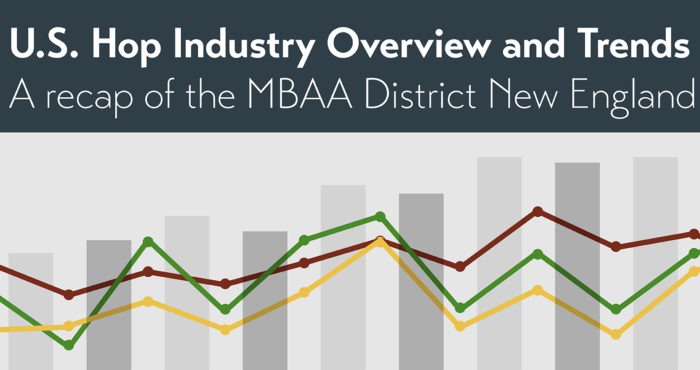5 Things Master Brewers Really Want To Know About Hops
The Master Brewers Association of America, New England District gathered on the campus of the Anheuser-Busch Brewery in Merrimack, NH for its Spring Meeting the weekend of April 15-16.

As Haas’ National Sales Manager, Roy Johnson felt quite fortunate because the Saturday morning session was deemed a “Hop Summit.” He shared the stage with Shane Dale of BSG and Gene L’Etoile, a local hops farmer from Northampton, MA. Roy led off the presentations with a 2015 – 2016 hop crop update, Shane followed and talked about new technologies in hop processing and Gene shared his fascinating journey from career engineer to that of a full-time farmer – and how he came to grow and sell hops in the northeast. A Q&A followed and it was in these questions that the panel uncovered what was on the minds of the 80 or so brewers in attendance – as far as hops are concerned at least! The following are a few of the questions posed to the panel which Roy found to be the most relevant and the responses he shared on each.
1. How much pressure is there really on available acreage in the Pacific Northwest (PNW)? And assuming that the pressure is real, is there potential for additional acreage in CA where there used to be farms?
There has been ever-increasing pressure on land availability for hop acreage over the past decade especially. In fact, we’ll probably see over 5,000 more acres planted in the next crop year alone – almost all of it for aroma hops. For just this reason, we are seeing hops being grown where they have never been before or haven’t been for decades. Regardless, almost all the growth (on a percentage basis) is occurring in the PNW (Washington, Idaho, Oregon). As for California (primarily northern California), we don’t think we’ll see much activity there due to the limited availability of water resources. And even if the water issue could be resolved California farms would require new hop processing infrastructure that makes the whole notion quite cost prohibitive and highly unlikely.
2. Where else are hops being grown across the U.S besides the PNW? What are some of the statistics associated with hop acreage and production outside the PNW and how quickly is that production increasing?
If you look at hop acreage in the U.S. it should reach almost 52,000 acres in 2016 with over 95% of it being located in the PNW. And with the higher yields achieved in the PNW about 98% of all hops production comes from this region too – with close to 75% of that total coming from Washington state alone. In comparison, we understand that Michigan is pushing to get to almost 2,000 total acres by 2020. The good news in Michigan is that they appear prepared to make the necessary capital investment needed to put the processing infrastructure in place to handle this growth. The challenge for them – and many other regions across the country – is that limited sunlight and highly humid conditions can invariably lead to mildew issues that put real pressure on yields. We are also seeing some movement in WI and NY – primarily due to tax credits for the use of in-state products. Nonetheless, we are estimating only a modest expansion of acreage in the non-PNW regions over the next 5 years.
3. What do hops growers/suppliers need from brewers – what are best practices – to help you manage short- and long-term hop planning?
It’s incumbent on both brewers and their hop suppliers to remain in constant communication on changing brand portfolios and increases or decreases in overall business. Changes will always occur as the consumer tastes ebb and flow but working together to guard against unexpected and last-minute changes will help keep brewers well stocked with the hops they need. It might be worth having a look at a blog post that Pete Mahony, the Vice President of Supply Chain Management at Haas, recently wrote on just this subject (The State of the Hops: Talking Supply Chain with Pete Mahony).
4. There are more and more proprietary hops varieties – how long do they stay proprietary before they become public?
Patents on proprietary hops are good for 20 years after the patent is granted. At that time those hops can be grown/sold by others, but all rootstock is still owned by the respective plant breeding companies and therefore the ability to grow these varieties past expiration of the patent is subject to obtaining root materials from the owner of the variety. Furthermore, they cannot use the names of proprietary hops that have been trademarked.
5. You shared that it takes 12 years to develop a new variety. That seems very expensive and risky. How do you plan and manage it?
Breeders and farmers are constantly working towards identifying new varieties – that’s their job and their focus. And many in the industry aren’t aware of it but Haas along with Select Botanicals are founders of the Hops Breeding Company. So investment in new varieties is a major priority for John I. Haas. We’ve got over 100 dedicated acres of experimental farms in Yakima. Any new variety starts as a single plant and with feedback from many sources – brewers primarily, our customers – those hops with the most potential earn expanded acreage; a single plot might give way to a mound and then a ½ acre and so on. So brewer feedback and brewing trials are the drivers of a varieties continued success. And I should mention that Haas built a 2.5hl, 5-vessel state of the art brewhouse only a few years ago. We call it the Innovations Brewery – the opportunity to actually brew beer with the experimental hops is an important driver of our ability to bring those new varieties with the most potential to the market.
